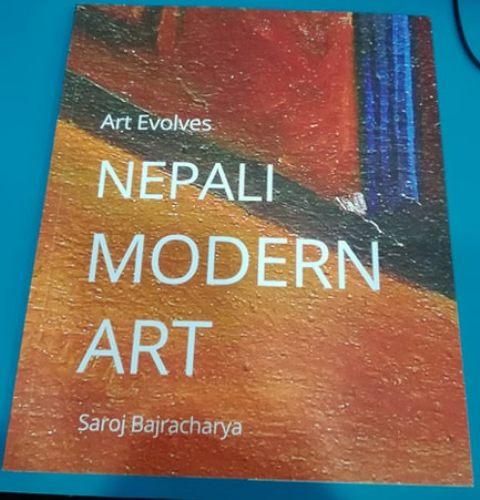Photo Courtesy: Businessmanager
Imagine a world of perfection with everything and everyone in place. We perceive this state as ‘Utopia.’ I feel imagination of such a system enjoys flaw at the very principle level. Yet, I would like to cast these hurdles aside to imagine a system suitable for everyone in a way nobody's needs are compromised. Now I would like to bring certain facts into consideration to understand the entire functional dynamics of such society.
By the very virtue of its name, a utopian society will take to addressingthe needs of its peoplebefore they could even be felt.It will not let its people realize their needs. I wonder what good is a state of dwelling that aims at quenching thirst before it could even be felt. Will people, as such, ever identify what thirst is and how it feels having it quenched? It is liable to restrict fulfillment like does a deprived society.
‘Art Evolves: Nepali Modern Art’: Review

There is a very thin line difference between an absolutely perfect society and an absolutely imperfect one. What we know as absolute perfection might as well be worse compared to what we know as absolute imperfection for there, at least, are diversion pockets called ‘art’ in an imperfect society. Would there be need for art in a society adhering to utopian perfection? Art, from the undercurrents of present state of society, is a glass revealing people's emotions, their quenched and unquenched desires, hopelessness, contentment andmisery. Would a utopian society house emotional diversity as this? Or is it likely to be a society with no emotions for there will be no hopelessness, misery, hunger and desire? Absence of such emotional parameters will lead to absence of complacency and thus ecstasy. Does one who never had to get out of ecstasy really know he is in anecstatic state after all? Will such ecstasy really be ecstatic? At a circumstance as such, ecstasy will serve to be the most futile thing ever.
I can recall 'The Time Machine' by H. G. Wells, the sort of people the protagonist meets upon his travel to future; mechanical and naïve people bound in a particular routine, who because of not having to struggle or think, labor or suffer, transform into a robot-like thing and develop a body ultra-perfect and a mind ultra-weak. It is a development worthy of dreaming but not of achieving. Will utopia, too, give rise to something of that sort? But shouldn't something so perfect as utopia give rise to constructive approaches like art and continuous growth? Or will art, instead, be manifested in some other forms we can think not of ?
Now willart and continuous growth, despite being constructive and highly anticipated things, must have, as such, anything to do with utopian society except manifesting its inutility? A long inhabitation in a stage we call imperfection has made us long for growth so desperately that a life without it appears to be the most useless life ever. Despite these, how can something that demands further growth, after all, be perfection? Is perfection not the utmost level of growth, not only from that time frame in particular but from every other point of time? We, having lived in an imperfect world, have so much wished for positive change that we cannot think of positive change not happening in utopia. Would a utopian society really change with time? What sort of changes would it be? Would it be changes in physical infrastructure, or in social infrastructure or in spiritual one? Isn't changing with time a slur on Utopian society even if it is positive change, for everything will be so perfect that any kind of change would mean a disruption in the entire system, and everything will be so perfect that there can be no increase to it. An increase in perfection is uncountable. Also, there can be no increase in perfection. I agree certain perfect entities even when altered to a great intensity remain perfect. Still, isn't perfection a constant entity in terms of amount? Should it not remain constant even after tons and tons of additions on it? Does it then mean that a utopian society will allow for change and still remain perfect? The question that arises is why change? Can change be an alternative to art?
What will bonds be like in a utopian society? Bonds have been seen to get strengthened as a result of sharing of problems and deficits. Provided that there will be no deficit in a utopian society, what will happen of bonds? Will it, instead, be a society where bonds aren’t needed at all? Now will a society of no bond prevalent between its people still be utopian? It would mean a society of no humanity.
What we've known to be desired output have always been outputs based on absence of miseries and the parameters addressing outputs have been parameters likely to neutralize the current problems. Will a Utopian society, in the absence of a these problems, have its own parameters for some other forms of outputs? Will it, too, be likely to have challenges like ours but for achievement of some higher forms of output? Is it that the concept of utopia is a relative concept and exists merely for a societal stage immediately below it? Can it be that what we perceive to be utopia is utopia merely for us, the possibility being existence of another utopia in the minds of people living in our Utopian city? Also, perhaps we too serve as a utopia for a society immediately below us.
Is utopia perfection in terms of measures of happiness and bliss or is it a utopia visualized in terms of the parameters available for happiness? Is it a set of situations yielding us a sound sleep that we refer to as utopia or is it availability of a bed to sleep on that forms it? Having said that, I feel perfection is a relative term and we have somehow been inhabiting it. In an era so much advanced, and yet so close to the infancy of science, I feel this is how perfection is meant to be, presumably flawed and rumpled. The world we inhibit is so perfect as to allow us a room for art, a room for growth and a room for bonds with certain gaps to be filled. Each of us must contribute toward filling of the gaps.
The author is a Sociologist at Kathmandu Valley Development Authority.






































